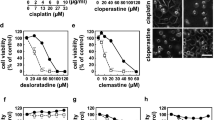Abstract
Cimetidine is known to enhance the survival of gastro-intestinal cancer patients, though the mechanisms involved are incompletely understood. Postulated modes of action include blocking the proliferative effect of tumors and inhibiting T suppressor cell activity, both of which are thought to be mediated by histamine type 2 receptors. Apoptotic cell death may offer an alternative explanation for reduced cell growth. We aimed to examine the effects of histamine, cimetidine, and ranitidine on in vitro proliferation and apoptosis in two human colorectal cancer cell lines, Caco-2 and LoVo. A cell proliferation assay was used as an index of cell growth. Histamine receptor status was determined by quantifying cyclic adenosine monophosphate and apoptosis via DNA fragmentation. Results show that histamine (10−5 to 10−9 M) had no effect on the growth of either cell line. The proliferation of Caco-2 was inhibited by ranitidine (10− 7 M) alone and in combination with histamine. Cimetidine (10− 5 M) only suppressed the growth of Caco-2 in the presence of histamine. The H2 antagonists had no effect on LoVo irrespective of histamine. There was no accumulation of cyclic adenosine monophosphate in Caco-2 cells in response to histamine at a similar concentration. Apoptosis was induced in Caco-2 by both antisecretory drugs, and only ranitidine caused apoptotic cell death in LoVo cells. We conclude that cimetidine and ranitidine inhibit Caco-2 cancer cells in vitro, independently of the H2 receptor. In addition, both drugs induce apoptosis in the same cell line. Growth inhibition and apoptosis are likely to contribute to the tumor regressive properties of cimetidine and ranitidine in vivo.
Similar content being viewed by others
REFERENCES
Tonnesen H, Bulow S, Fischerman K, et al.: Effect of cimetidine on survival after gastric cancer. Lancet 2:990-992 1988
Adams WJ, Morris DL, Woss WB, et al.: Cimetidine preserves nonspecific immune function after colonic resection for cancer. Aust NZ J Surg 64(12):847-852 1994
Matsumoto S: Cimetidine and survival with colorectal cancer. Lancet 346:115, 1995
Svendsen LB, Ross C, Knigge U: Cimetidine as an adjuvant treatment in colorectal cancer. Dis Col Rect 38(5):514-518, 1995
Nielsen HJ, Christensen IJ, Moesgaard F, Kehlet H: Danish RANX05 Colorectal Cancer Study Group. Ranitidine as adjuvant treatment in colorectal cancer. Br J Surg 89:1416-1422, 2002
Garcia-Caballero M, Nunezed X, Castro I, Kusche J, Vora-Thorbeck L: Histamine metabolism in human breast and colorectal cancer: Its effect on other host tissues. Adv Biosci 89:273-287, 1993
Fisher B, Wolmark N, Rockette H, et al.: Postoperative adjuvant chemotherapy or radiation therapy for rectal cancer: Results from NSABP protocol R-01. J Natl Cancer Inst 80:21-29, 1988
Watson SA, Wilkinson LJ, Roberson JFR, et al.: Effect of histamine on the growth of human gastrointestinal tumours: reversal by cimetidine. Gut 34:1091-1096, 1993
Adams WJ, Lawson JA, Morris DL: Cimetidine inhibits in vivo growth of human colon cancer and reverses histamine stimulated in vitro and in vivo growth. Gut 35:1632-1636, 1994
Kumar A: Cimetidine: An immunomodulator. Ann Pharmacother 24:289-295, 1990
Kimura E, Koike T, Shimizu Y, Kodama M: Complexes of the histamine H2-antagonist cimetidine with divalent and monovalent copper ions. Inorg Chem 25:2242-2246, 1986
Hansbrough JF, Zapata-Sirvent RL, Bender EM: Prevention of alterations in postoperative lymphocyte subpopulations by cimetidine and ibuprofen. Am J Surg 151:249-255, 1986
Katoh J, Tsuchiya K, Sato W, Nakajima M, Iida Y: Cimetidine and immunoreactivity. Lancet 348:404-405, 1996
Kobayashi K, Matsumoto S, Morishima T, Kawabe T, Okamoto T: Cimetidine inhibits cancer cell adhesion to endothelial cells and prevents metastasis by blocking E-selectin expression. Cancer Res 60:3978-3984, 2000
Matsumoto S, Imaeda Y, Umemoto S, Kobayashi K, Okamoto T: Cimetidine increases survival of colorectal cancer patients with high levels of sialyl Lewis-X and sialyl Lewis A epitope expression on tumour cells. Br J Cancer 86:161-167, 2002
Sasson AR, Gamagami R, An Z, Wang X, Moossa AR, Hoffman R: Cimetidine: An inhibitor or promoter of tumour growth? Int J Cancer 81:835-838, 1999
Lawson JA, Adams WJ, Morris DL: Ranitidine and cimetidine differ in their in vitro and in vivo effects on human colonic cancer growth. Br J Cancer 73:872-876, 1996
Cory AH, Owen TC, Barltop JA, et al.: Use of A tetrazolium/formazan assay for cell growth assays in culture. Cancer Commun 3(7):207-212, 1991
Volker TT, Viratelle OM, Delaage MA, et al.: Radioimmunoassay of cyclic AMP can provide a highly sensitive assay for adenylate cyclase, even at very high ATP concentrations. Anal Biochem 144(2):347-355, 1985
BurtinC, Scheinmann P, Salomon JC, et al.: Decrese tumour growth by injections of histamine or serotonin in fibrosarcomabearing mice: influence of H1 and H2 histamine receptors. Br J Cancer 45:54-60, 1982
Burtin C, Scheinmann P, Fray A, et al.: Ranitidine and cancer. N Engl J Med 310:1603, 1982
Beer DJ, Rocklin RE: Histamine modulation of lymphocyte biology: Membrane receptors, signal transduction and functions. Crit Rev Immunol 7:55-91, 1987
Gifford RRM, Gamble CE, Schmidtke JR, et al.: Cimetidine aug-mentation of in vitro generated cell mediated cytotoxicity. Surg Forum 31:379-382, 1980
Gifford RRM, Vallera DA: Cimetidine induced augmentation of murine cell mediated cytotoxicity following in vitro and in vivo treatment. Fed Proc 39:924, 1980
Morris DL, Adams WJ: Cimetidine and colorectal cancer-Old drug, new use? Nature Med 1(12):1243-1244, 1995
Lawson J, Adams W, Morris D: Cimetidine but not ranitidine inhibits histamine stimulated growth of the human colonic cancer cell line C170. Aust NZ J Surg 64:361, 1994
Tutton PJ, Barkla DH: Comparison of the tumour inhibiting effects of three histamine receptor antagonists. Anticancer Res. 3:7-10, 1983
Soldatenkov VA, Danisenko MF, Khodarev NN, et al.: Early postirradiation chromatin degradation in thymocytes. Int J Radiat Biol 55(6):943-951, 1989
Wyllie AH, Kerr JFR, Currie AR: Cell death: The significance of apoptosis. Int Rev Cytol 68:257-306, 1980
Author information
Authors and Affiliations
Rights and permissions
About this article
Cite this article
Rajendra, S., Mulcahy, H., Patchett, S. et al. The Effect of H2 Antagonists on Proliferation and Apoptosis in Human Colorectal Cancer Cell Lines. Dig Dis Sci 49, 1634–1640 (2004). https://doi.org/10.1023/B:DDAS.0000043377.30075.ac
Issue Date:
DOI: https://doi.org/10.1023/B:DDAS.0000043377.30075.ac




